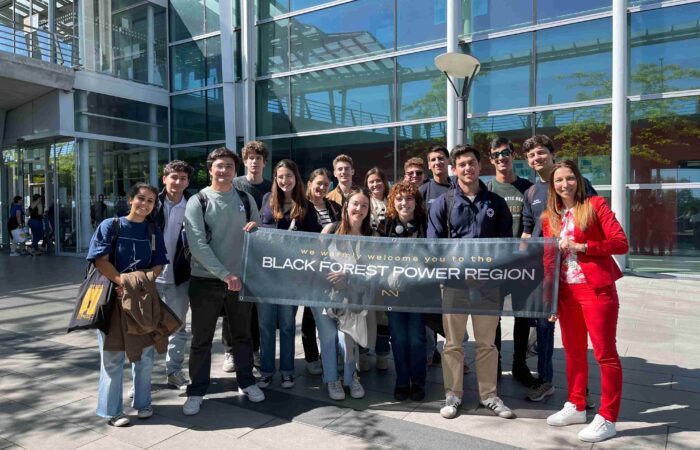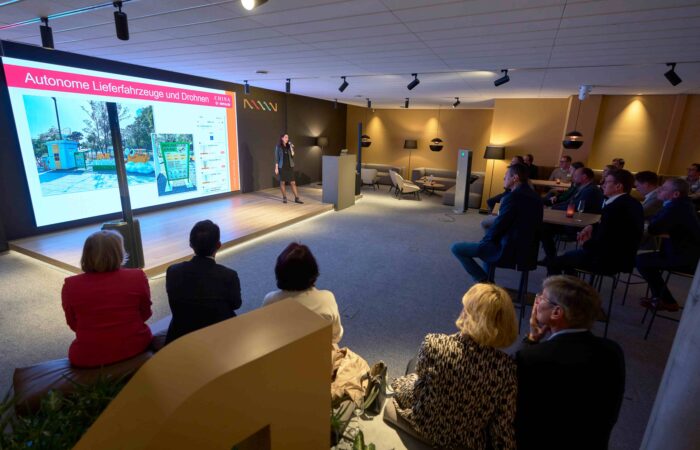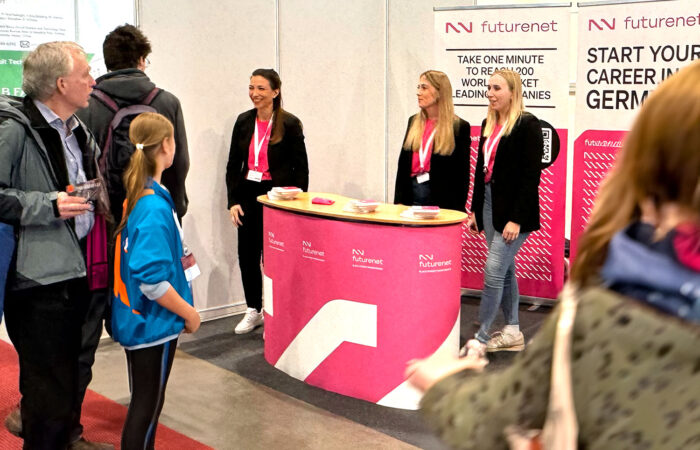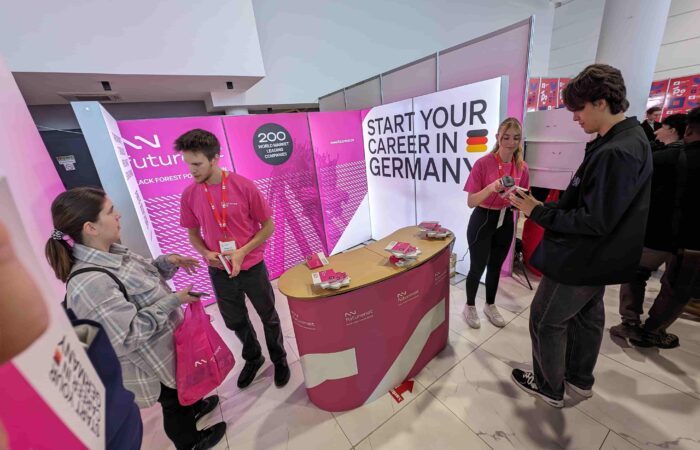“Have to let the economy do its thing”
The WRO economic region is now called Nectanet. Managing Director Dominic Fehringer outlines the international strategy in an interview. He also explains why Ortenau deals differently with the Chinese IT giant Huawei than the USA.
Mr. Fehringer, 180 companies and almost all municipalities in the district belong to Nectanet. You have continued the active work of your predecessor Manfred Hammes and set new, above all digital accents. Why do we need a new strategy now?
The world is changing rapidly. Every company has to reinvent itself. Public administrations are also under great pressure to push ahead with digital innovation in particular. The changed environment is a challenge for everyone, and one that business development must also face up to.
What does this strategy look like?
In an intensive process, shareholders and advisory board members decided on a new strategic direction last year. In the coming period, Nectanet’s work will focus on location marketing, the shortage of skilled workers, attracting investors, internationalization, innovation and start-ups, facilitating international connections and networking.
You have repeatedly emphasized that the old name WRO required too much explanation. This also applies to Nectanet. Why did you choose him anyway?
The name WRO was the right term for the company during the development phase. The focus was on an inward orientation. The main task was to create a sustainable regional network. This goal was achieved. The network is considerable in size and scope. The aim now is to leverage more and more synergies from this network. Nectanet must be more than just a network. When developing the strategic areas of responsibility, we realized that we could not avoid a reorganization of our brand policy. As a regional development company, Nectanet is increasingly taking on tasks with an international focus. The new associative brand unfolds its strength in international operations and in the digital space. With Nectanet, we are consciously taking a bold step into the future.
Does the reorientation of Nectanet towards markets such as Brazil mean a move away from China, which you had focused on as the lead market for the WRO? Was this strategy perhaps even a mistake?
Quite the opposite. As a network node, Nectanet can open up the diverse connections to the whole world for the entire network and make them usable. We maintain close links with partners in China. We want to further intensify the connections we have developed and maintained over the years. Important industrial companies from Ortenau are currently investing in production facilities there. But China is no longer just a sales market for products from Ortenau. Beyond basic research, Chinese science is scaling technologies like no other country. The result is a wealth of completely new ideas, companies and products. In addition, there are other factors such as motivation and a willingness to innovate. In short: the future is being created here. And you should always keep an eye on them.
And why Brazil?
Looking towards South America does not mean turning away from relationships in other regions of the world. As the largest economy in South America, Brazil lends itself to a closer look. We focus on meeting with well-known Brazilian companies, exchanging ideas with political decision-makers and addressing labor market issues such as the shortage of skilled workers and sustainability issues, in particular carbon offsetting.
Nectanet to open doorsffThe company will be a hub for municipalities and companies to engage in dialogue with the Chinese technology giant Huawei and thus make progress in digitalization. Countries such as the USA, New Zealand, Australia and Canada have now decided against expanding their 5G networks with Huawei’s technology for security reasons. Can the company still be the right partner for Ortenau?
Our decisions cannot be based on political initiatives designed to favor certain manufacturers. We are guided by authoritative and trustworthy institutions. First and foremost, this includes the Federal Office for Information Security, which checks the trustworthiness of products from all manufacturers. The Bundestag has passed laws that provide for strict testing of critical components of mobile communications technology. This has created a particularly tight security framework in Germany. Recently, Alois Knoll, Professor at the Technical University of Munich, showed us how close the research cooperation between the university and Huawei is. Together, they are researching the vehicle of the future, the so-called software-defined vehicle. Another example: A company from the Economic Advisory Board has switched a large part of its IT infrastructure to components from Huawei – with great satisfaction. This is certainly not done carelessly or thoughtlessly, but on the basis of unbiased examination.
So you are not following the US approach?
For reasons of economic and power politics, you will receive little enthusiasm for cooperation with Chinese market participants in all economic sectors. However, it cannot be our role to jump over every stick that other countries, even friendly ones, hold out to us. You cited New Zealand as another example. We should not be guided by this industrially completely insignificant island, which lies far out in the Pacific Ocean. As the largest economy in the heart of Europe, Germany needs its own economic policy strategy and an open view of the whole world. Carelessly slamming doors is not one of them. In our complex world, we are well advised not to make decisions on the basis of one-dimensional thinking. Our work with our Chinese partners is knowledge-based. Confucius left us the wisdom that he who wants will find ways, he who does not want will find reasons. This is a good basis for well-considered decisions.
In view of dramatic human rights violations and an increasingly nationalistic regime, what is the attitude of Ortenau-based companies towards China and the companies there?
I cannot answer this question as I have no knowledge of the attitude of the companies.
Does Nectanet’s international orientation still fit in with the increasing focus on the national and regional market?
Germany is an export nation. Today, and hopefully also tomorrow, our companies will be able to supply the world with exceptionally good products and services. Our prosperity is based on this. The strategic reorganization of supply chains is independent of this. There is a great temptation in Germany to react to the political decisions of other countries by correcting its own economic policy. I can only warn against this. Walter Eucken, the father of the Freiburg School, wanted to understand the shaping of the economic order as a contrast to political intervention in the market. The protection of open markets in a defined competitive order should be our benchmark. Companies need long-term security for investments and for further strategic decisions. Our international focus is also a good fit when it comes to approaching investors, specialists and in the areas of innovation and start-ups.
Expensive real estate, lots of bureaucracy and no workforce: how interesting is the Ortenau region for foreign companies and local start-ups?
The Ortenau region has a strong economy with an extremely diverse character and is more than worth living in in terms of location and recreational value. We cannot complain about a lack of interest. It is more the case that we have to turn down investor inquiries because the availability of space is limited. The municipalities are free to decide to whom they allocate their commercial space. That is good and right. Sustainability and value retention are often used as criteria. Start-ups in Ortenau can rely on professional and broad-based support. In recent years, we have developed an active founder community. Local centers with different content enrich the regional start-up landscape.
In view of the numerous current crises, how do you assess the economic prospects for Ortenau?
To stay in the style of Far Eastern wisdom: All the darkness in the world cannot extinguish the light of a single candle. Entrepreneurs from Ortenau are clever, level-headed personalities who do not shy away from challenges. We can have every confidence in the SME sector. But we also have to let them do it. To achieve this, we need less bureaucracy and less regulation – in all areas.
Many companies in Ortenau depend on the automotive industry. The industry is undergoing the biggest upheaval in its history. Is this a blessing or a curse for the Ortenau region?
Innovation can only ever be a blessing. But you have to find the right way to deal with it. We can support thinking by placing topics and creating connections. Decisions are made in the companies and I have no doubt that the companies concerned in Ortenau will find the right path for themselves, if they have not already done so.
What are the advantages of Ortenau as a location compared to other regions?
The combination of geographical location, people, economic basis and liveable environment can be described as unique. Almost every region advertises this, but it really applies here.
You have been Managing Director since 2016. Have you ever thought about new challenges?
I have been active as Managing Director for six years. That’s not even a full term of office for a mayor, measured by the standards of my shareholders.
What goals do you want to be measured by in five years’ time?
We want to be a reliable companion to the Ortenau economy and continue to generate real added value. This is not associated with a growth target in terms of additional shareholders or advisory board members, but a promise of quality.
An article by the Mittelbadische Presse / Wolfgang Kollmer and Jens Sikeler.
https://mittelbadische.de/







